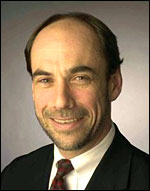
Douglas Holtz-Eakin.
Opinions differ on the quality of John McCain‘s domestic policy agenda, but you’d have trouble finding anyone in Washington who would disparage the man he’s chosen as one of his top advisers. Douglas Holtz-Eakin has a dauntingly long resume and a reputation among policy wonks on both sides of the aisle for fair-minded number crunching. He has taught economics at top-notch universities, served as a senior economist in both Bush administrations, and run the Congressional Budget Office from 2003 to 2005 (where he was a “thorn in the side” of the current administration). He is now running the Center for Geoeconomic Studies at the Council on Foreign Relations. I caught him by phone to get the scoop on McCain’s climate and energy policy.
[Editor’s note: You can read an unabridged version of this interview. Also check out Grist’s interview with John McCain.]
How urgent a problem is climate change in John McCain’s mind?
Sen. McCain has a very serious sense of urgency about moving on [climate] legislation, directly from his hearings and his travel to Antarctica to the Arctic. It is augmented by the national-security component. The idea that we’re sending $400 billion to nations where it is actively turned into financing for terrorists — and other nations who are simply not supportive of democracy — he finds that incredibly troubling.
You have distinguished McCain’s policy approach from his competitors’ by saying he favors putting a cap-and-trade system in place and otherwise refraining from further policies and regulations — even getting rid of a lot of sector-specific or industry-specific regulations and subsidies. How literally should we take that?
Probably wouldn’t take it that literally. The components that everyone has agreed are essential [to good climate policy] are, No. 1, pricing carbon in some way — the caps do that, showing a value to emissions reductions. No. 2, lots of flexibility in responding to the need to reduce emissions, so that you can take advantage of low-hanging fruit. And No. 3, radical technological advances, which would allow us to do business better. There’s going to be a role for policy in augmenting the technologies — basic research, targeting whatever it may be to allow us to burn coal cleanly, sequester carbon if necessary, those kinds of things. But to the extent possible, he’s interested in not having large, redundant mandates like carbon cap-and-trade and a low-carbon fuel standard, because those are both going to end up being the same thing when taken for the transportation sector as a whole.
One of McCain’s signature issues is opposition to subsidies and earmarks. But on climate policy, he insists on heavy subsidies for the nuclear industry. Is there a principled distinction between good and bad subsidies?
There’s a pretty straightforward philosophy. When you have a practice of providing subsidies, you invite lobbying on the part of special interests, and this leads to political corruption, if not criminal corruption. [McCain also has] a powerful belief that the private sector will pick the right thing, and the government doesn’t need to be in the business of doing that. You set the broad incentives and let it go. But then, there are roles for government. And if there’s a genuine national interest in using nuclear power as an available, feasible, zero-emissions technology, that’s not a special-interest thing. It’s something the nation needs to do as a priority. I think that’s an appropriate role for government, in his view.
Will McCain work to eliminate ethanol subsidies?
Yes. The exclusive reliance on corn-based ethanol is, in his view, inappropriate, relative to other potential sources for ethanol. And the combination of the subsidy and the tariff barrier against the sugar-based ethanol from abroad strikes him as inappropriate. He was certainly willing to stand up in Iowa, with his political future on the line, and tell people the truth. There was a speech at the BioEconomy Conference during the Iowa primary — he said, I’m a good Republican, and I like Iowa, but I’m opposed to these subsidies.
Economic models generally project that a carbon cap-and-trade program will raise energy prices for average families and slow the growth of GDP. What’s McCain’s response?
I am a Ph.D. economist and a former computer scientist; I have built econometric and simulation models of the U.S. economy. They are very good tools for ordering the impacts of different policies. They are least useful for predicting the actual outcome. Economic models have consistently underestimated the capacity of the U.S. economy to recover from shocks and to be flexible and grow.
Do you think climate policy could be a net GDP boost?
As an economist, I find the framing of the question disturbing. The world is a better place if you do this policy, even if GDP growth is a little bit smaller. But I absolutely agree it’s quite possible that instead of having what [the Energy Information Administration] is estimating to be modest impacts — a tenth of a percent on GDP growth — it could turn out to be positive. That’s well within the margins of error of these things
Do you think it’s fair to say that McCain will not implement mandatory caps in the U.S. until and unless China and India implement some sort of cap?
I think that’s fair. The main concern — expressed by folks who don’t want to see India and China free-ride and not suffer the same cost-containment issues — is that we do it, they don’t, and we’re at a competitive disadvantage. The senator’s very cognizant of that issue and doesn’t want to put anyone in the United States in that position.
[Editor’s note: Hungry for more? Read the longer, unabridged version of this interview.]


